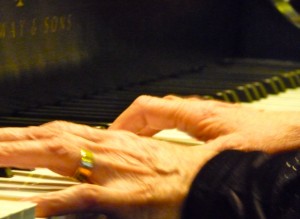Guest Posts
Unempty Moments
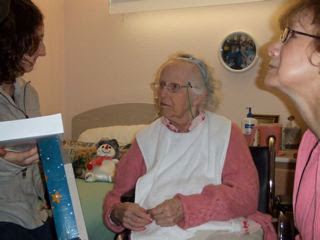
Aly, her mother and grandmother
I can’t remember anything but her underwear.
I can’t remember the day or even which convalescent facility we were in. I can’t remember what my mom was telling me or what I was wearing.
What I can remember is her underwear. They were big, literally granny panties. Soft cotton. Conservative white and new baby pink. No lace or ruffles.
I can remember how they folded softly in my mom’s hands. She caressed them absentmindedly as she spoke.
We were moving my grandmother into a new facility.
We were in the repeat-the-same-question-every-five-minutes stage of her dementia, not yet to the frantic wheelchair racing or the evergreen season of suspicion. She hadn’t yet looked desperately into my eyes and asked if I could find her mother.

Aly and her mother
But still, we were scared, my mom and I. Missing the mother and grandmother we once knew. The woman who remembered her legendary spaghetti and meatballs recipe and walked loops around her apartment complex with friends bearing names like Petey or Marge.
The fear hung silent between us as we unpacked her clothes, a few books, some pictures of toothy grandchildren for her bedside table.
Henri Nouwen talks about patience as one of the cornerstones of the compassionate life; impatience the deterrent that keeps us tapping our feet, checking our watches, and missing the glory of God.
By this point in the story, (like you I venture to presume) I should have been tapping my feet, checking my watch and writing off another summer afternoon as “empty, useless, meaningless.”
But I didn’t.
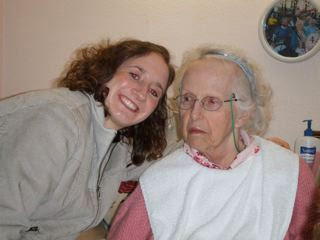
Aly with her grandmother
The counterpoint to impatience, Nouwen describes another rendering of time when we experience the moment as “full, rich, and pregnant.” When “somehow we know that in this moment everything is contained: the beginning, the middle, and the end; the past, the present and the future; the sorrow and the joy; the expectation and the realization; the searching and the finding.”
This was one of these moments. Watching my mom delicately fold my grandmother’s underwear. In this moment I was gripped by the thought that love need be nothing more than this simple, intimate act.
It became an unempty moment.* A moment I didn’t want to get away from. A moment filled with the glory of God.
To this day, this afternoon represents a rupture for me. A rupture that signaled not a fracture, but a deepening. A deepening love for my grandmother. A deepening respect for my mom. And a deepening gratitude for every humdrum moment-turned-miracle I had left with both of them, together in one room, folding underwear, in an unempty moment.
****
*Precious moments was already trademarked.
****
Aly Lewis is a twentysomething writer from San Diego, Ca. When she’s not writing ridiculously witty and yet still thoughtful and inspiring copy for the international non profit Plant With Purpose, you can find her roller blading, showing off her dope hip hop moves, or overanalyzing her quarter life crisis. She has a passion for social and ecological justice, anyone who speaks Spanish, and experiencing the God of the unexpected. You can check out her mismatched musings on life here: http://memoirsofalgeisha.blogspot.com/.
And make sure you are one of the first followers of Aly’s newly hatched Twitter account!
On Not Knowing Where Your Dad is Buried
Today’s guest post is from Lisa Colón DeLay, who describers herself as “CREATIVE, NINJITSU INTERVIEW PRACTITIONER, IMPROMPTU HUMORIST, DISPENSER OF FREE SAVVY, SPIRITUAL FORMATION PROVOCATEUR.” You can stalk her on Facebook, follower her on Twitter and visit her blog. But, be forewarned, if you attempt any form of stalkery, her Ninja skills will find you out.
****
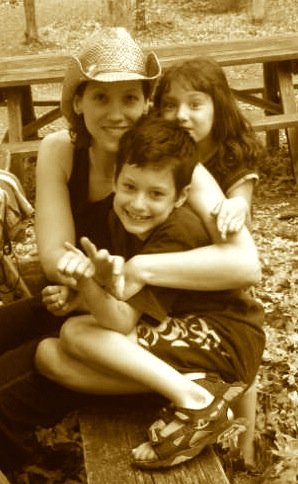 The long and drawn out precursor to my father’s death is something out of a bad made for TV movie. It has all the twists, turns, and unbelievability that would make a most incredulous 90 minutes on the small screen. After all, how many people do you know incur a brain stem infarction (kind of like a stroke, but much creepier and not nearly as well-known) only to live through it, become permanently brain injured, and profoundly disabled (think: Terri Schivo). Then comes the 11 year grieving process as he physically wastes away in a nursing home, battling countless infections. At the onset, I was 20 and my father was 44. You can’t make stuff like this up. And I didn’t even mention the lawsuits.
The long and drawn out precursor to my father’s death is something out of a bad made for TV movie. It has all the twists, turns, and unbelievability that would make a most incredulous 90 minutes on the small screen. After all, how many people do you know incur a brain stem infarction (kind of like a stroke, but much creepier and not nearly as well-known) only to live through it, become permanently brain injured, and profoundly disabled (think: Terri Schivo). Then comes the 11 year grieving process as he physically wastes away in a nursing home, battling countless infections. At the onset, I was 20 and my father was 44. You can’t make stuff like this up. And I didn’t even mention the lawsuits.
Death and its many friends wreak havoc on an already shattered family. The details are scandalous, but not as important or profound as a memorial service with no body with whom to part. The trouble isn’t so much the service or the memorializing, it’s not being told where they laid him. It’s not just me–it bothered Mary Magdalene quite a bit too. My step mother still sends Christmas and Easter cards, but she’s never told me where my father’s ashes are buried. He could be on her mantle, for all I know, or interred at a secret place as a result of paranoia. A bit of spite can go a very long way.
And so what resurrects is not a hope in seeing my dad’s resting place, but rather in understanding that many, if not most things in life remain outside of my control. Even things one would consider simple and common.
I’ve thought about what I’d do if I knew where my father was buried. In the movies it’s always raining when they bury someone. Later when people visit the grave, it’s usually breezy. It’s warmer out too, which is nice. I would pick a mild day. 72º and mostly sunny. I’ve pictured myself putting notes, or flowers, or photos near the headstone. Praying as a sit in the grass near the site, or singing. A grave doesn’t help the one who died, I’ve realized. It helps the one who’s left behind.
Transforming from the bruised hopes of a missed connection with a departed loved one, I think more about the living now, not the dead. And about my own living. Some of that I can and should control. Photos and memories take the place of a gravestone, and I try to do right by how my dad would want me to think about the situation.
He’d want me to be gracious. He’d want me to remember not where he was buried, but how he loved me, and the better parts of how he lived. And that is actually the same thing I want for my own children. The bigger lesson is in the living memory, not the ground marker. (I say this to myself when I’m feeling particularly strong.)
Maybe the marked spot would trap me somehow the way an unknown spot never can. Maybe it’s not so savage after all. Maybe I can find a gift in the pile of manure. With a Living God this is possible.
I wish for everyone to get whatever they need in the process of grief. I understand what mementos mean. They are precious things because they signify something that mattered. They honor what was lost. But for those who have nothing to call a burial place for someone they love, I wish for freedom from that sort of extra hurt. I wish for something bigger and life-giving to grow out of that tender spot.
A Tiny Casket, A Hole in the Ground, and Heaven
Bill Stauffer is a pastor in rural NJ, where he mostly chases around his eight-year-old twins. He likes to chase his wife, too.
*****
It was a terrible tragedy – unspeakable – and it was making the rounds on Facebook: a local two-year-old boy killed in a house fire. As the details came out, there were a number of families in town sharing in the grief of this boy’s death. A little boy, lost to his father, his stepfather, his mother (sedated and in the hospital still days later), and all types of extended and blended families and relationships. A number of them in the church where I am an associate pastor.
The weird thing about death for me is that it was so present in my early life, that even the worst of tragedies now require me to step way outside of myself to feel them for others. It’s like a scar with no nerve endings. By the time I was ten, I had lost all of my grandparents, two uncles, a number of family friends, and my father. Death shaped me. I knew it was shaping these people, too. It was carving out new chasms of pain. They were becoming more human.
Because one of the boy’s cousins was in my youth group, I was asked to lead the graveside service, as the Catholic priest who was presiding at the funeral mass could not be there because of a prior commitment. Whenever you get asked to preside over death, something happens. You sense a seriousness come over you. It’s involuntary. You will have the final say in people’s interaction with their loved one. Perhaps more than that, you will have the outrageous privilege and responsibility of helping them bridge this world and the next. In this case, it was connecting the infinite with a little boy in a tiny casket suspended over a gaping hole in the ground.
I was raised Catholic. When I step inside a Catholic Church building, unlike most other ex-Catholics I know who went over to the protestant dark side, I have a sense of coming home. My uncle, a priest himself, was one of the finest men I ever knew. He was the constant in my family when death reigned during my early years. The smells, the sounds, the liturgy, the bad music – it’s like putting on your favorite pair of comfortable, but woefully out of fashion shoes. You would never wear them in public, but in private, you miss them and occasionally slip them on to knock around the house in.
What struck me this day as I entered the narthex of the church was the open grieving already taking place. That was familiar, too. I can clearly hear my Aunt Peggy crying and screaming over the open casket of my uncle, her brother, Billy, dead in his early 40’s. I was five. It was surreal, but very emotionally honest. We button down Protestants need some of that in our emotional mix – honesty. This little boy’s family was grieving like that, and strangely, it gave me a sense of hope for them. It certainly gave me love for them.
During the funeral mass, from my vantage point in the back row, I viewed a room full of people full of sorrow, hopelessness, pain, and anger, with no outlet but flowing tears. My friend Sue was next to me in the pew. When she saw the tiny casket, she wept. “That’s not right!” The father and the stepfather carried their little boy up to the front of the church. Impossible to fathom.
At the graveside we stood at that intersection, the visible and invisible, and tried to make sense of what we could. I told them that little Zack was safe in Jesus’ arms. I told them that Jesus hated death; that it frustrated and angered him. I told them Jesus knows. He knows. He knows.
About their anger. I told them to take it to God in full force, that he was big enough to handle it from them, that is was real and needed to be voiced. God is such a pragmatist. He uses what’s at hand to grab hold of us. He uses pain and suffering to draw us to him. He uses joy and pleasure. Anything, really – whatever is in the emotional cupboard at the time. And that’s when it struck me.
Death is a spiritual ear opener. It unplugs the hard, waxy buildup of mundane, self-consumed life and lets us hear eternity calling. And in that moment, standing by that tiny casket over a gaping hole in the ground, it happened. There, in the cold, listening to the weeping and sniffling and occasional outbursts of tears, heaven spoke. It was Jesus saying, “Come to me, and bring your suffering. Bring your sorrow – I know. Bring your anger – I know. Bring your hopelessness – I know that, too. I’ve got what you need. Me”
Jesus was there, in Zach’s most frightening hour. He was there to comfort and take Zach home.
And I pray that Jesus — as Zach’s family grieves in the months and years to comes — takes this broken and beautiful family in His arms and ravages them the only way a good God can. They, and we, can live in the love of a God who wants nothing more than for us to simply “Come.”
A Lesson in Significance from My Mom’s Funeral
Andi Cumbo is a writer, editor and writing teacher who is currently working on a book about the people who were enslaved on the plantation where she now lives. She blogs regularly at www.andilit.com and if you’d like more information about her book project, you can visit her Kickstarter page.
*****
It’s easy to think that to make a difference we have to do great things – cure a disease, write a bestseller, invent the newest social network, end hunger. Somehow, we have come to think that greatness only comes with magnitude, not with simplicity or individual attention. We have some to see the day to day as mundane, unimportant, invaluable. My mom knew better.
The church that day seemed to shimmer with light. Despite the tears and the grief, the place felt serene, peaceful, uplifted, like a strong arm was pulling us all close to share our warmth with one another.
Every single pew was full of people who loved my mom. I don’t know why this surprised me; she was loved by everyone who knew her. I suppose somehow I had absorbed the view she had of herself – that she was “just a piano teacher” and “just a church choir director.” Inadvertently, I had come to understand her as she saw herself, but no one ever thought of her as “just” anything.
Each week for over 20 years, Mom taught dozens of kids how to play the piano, but while there was music involved in her lessons, more than anything, these were times where her kids (as she called them)got one on one attention from someone who, despite lack of familiar relation, loved them unconditionally. She would tell me about them when I came home to visit – the funny stories they shared about school and the challenges they faced with the demands of childhood. That time on the piano bench with Mrs. Cumbo was precious – for them and especially for her.
One evening a week, Mom led the church choir. Her practices – I was recruited for many of them by means of daughterly obligation and mirth – were full of laughter and Mom’s dry, dry wit. Her sense of sarcasm blended perfectly with her tact to make her not only a very accomplished director but a motivator as well. While we may never have rivaled the Cambridge Singers, Mom always helped us make a “joyful noise.”
So that day, one year ago, where we filled the church to celebrate Mom’s life, when the place was haloed in love and a peace that passes all understanding, we did our best to make a joyful – if tearful – noise, in honor of the woman who was never “just” anything. The woman who knew meaning and change came through a piano bench and a little sarcasm on a Sunday night. Thank you, Mom.
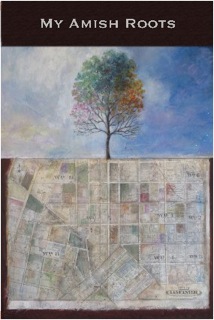
 Do we have any tangible ways of preparing for death? Or do we spend most of our time denying the fact that it will someday happen to us?
Do we have any tangible ways of preparing for death? Or do we spend most of our time denying the fact that it will someday happen to us?